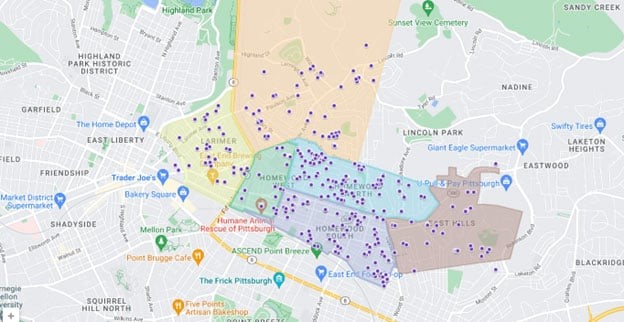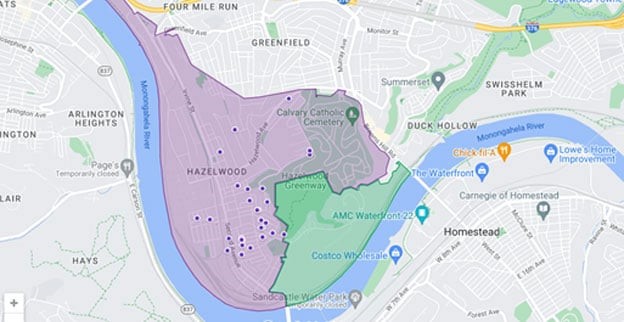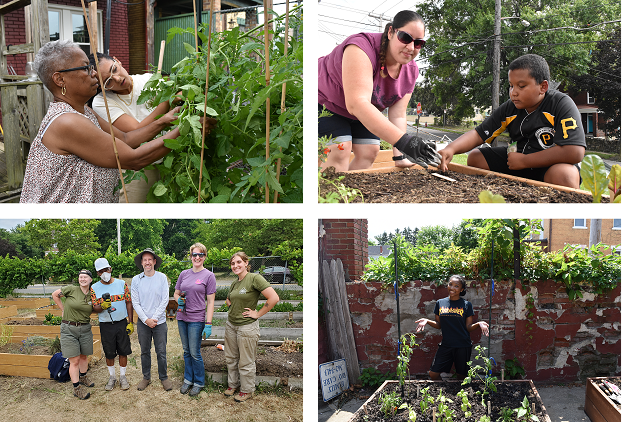Phipps Conservatory’s Homegrown Celebrates Tenth Anniversary
For Immediate Release: Tues., March 19
Contact: Joe Reed | Senior Director of Communications
412-622-6915, ext. 3801 | jreed@phipps.conservatory.org
Phipps Conservatory’s Homegrown Celebrates Tenth Anniversary
Phipps Edible Garden Program Reflects on the Past Decade and Looks Toward Another Year of Helping Local Communities
Pittsburgh, PA –Pittsburgh, PA – This year, Phipps Conservatory and Botanical Gardens celebrates the tenth anniversary of Homegrown, a community outreach program dedicated to increasing community access to fresh produce, promoting better food choices and improving the overall health of families and children. The Homegrown program began in Homewood and has since expanded to include Larimer, Lincoln-Lemington-Belmar, East Hills and the Greater Hazelwood area (Hazelwood and Glen Hazel).
Since its inception in 2013, Homegrown has installed almost 400 raised-bed vegetable gardens, totaling over 700 raised beds, at households in neighborhoods with low food access. The program has provided valuable mentorship and resources to hundreds of community members. Homegrown gardeners have each harvested an average of 35-40 pounds of produce each summer. Through their partnership with Homewood-Brushton YMCA, 1,600 pounds of free produce have been harvested since 2021. Over the past ten years, 875 people have gained access to Homegrown gardening resources and over 3,000 community members have received produce shared by a Homegrown gardener.
In the coming years, Homegrown looks forward to continuously educating and equipping local gardeners across the region.
Homegrown participants share their thoughts:
Jamie P. says, “My grandma would have been so happy if she knew that gardening changed my life in the way that it did.”
Bernadette R. describes how relaxing it is to be in the dirt and how she felt particularly appreciative of her plants during the pandemic.
Missy T. shared that when she needed to do physical therapy, her aunt brought her a spade and soil to use as her recovery, and her love of gardening took off. “What started as physical therapy ended as mental therapy.”
Eva C. shares this advice: “Grow, grow, grow and share with your neighbors and friends.”


The above maps show the full coverage of Homegrown installations across the various neighborhoods it serves.
In addition to raised-bed vegetable gardens, Homegrown also offers a wide variety of classes that aim to build gardening skills and knowledge so that participants can keep their gardens growing. Homegrown has hosted over 100 classes that community members have found both enjoyable and greatly beneficial. Covering topics from weed and pest management to plant-forward cooking skills, monthly classes and periodical workshops allow new gardeners to realize the full potential of their raised beds while offering opportunities for neighbors to connect.
"I love how gardening looks different for every person. Some people have fun getting their kids or grandkids involved. Sometimes adults help out when their parent has health issues. Other people say their garden is their space for relaxation! Everyone in Homegrown makes it their own," says Homegrown Garden Installation Coordinator Allison Glick.
To learn more, visit phipps.conservatory.org/Homegrown.
###
About Phipps: Founded in 1893, Phipps Conservatory and Botanical Gardens in Pittsburgh, PA is a globally recognized green leader with a mission to inspire and educate all with the beauty and importance of plants; to advance sustainability and promote human and environmental well-being through action and research; and to celebrate its historic glasshouse. Encompassing 15 acres including a historic 14-room glasshouse, 23 distinct indoor and outdoor gardens and industry-leading sustainable architecture and operations, Phipps attracts more than half a million visitors annually from around the world. Learn more at phipps.conservatory.org.
Watch TEDx: What We Can Learn From an Old Glasshouse: A look at the evolving way we connect people to nature at Phipps, demonstrate how human and environmental health are inextricably connected, and show that to age gracefully, we must continually reinvent ourselves to evolve with the rest of the world.



